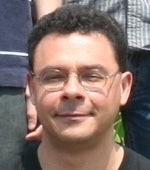
Luis Ibáñez works as Senior Software Engineer at Google Inc in Chicago. Opinions expressed in this site are his own.You can find him in github at: http://www.github.com/luisibanezand in twitter at: http://www.twitter.com/luisibanezHe previously worked as a Technical Leader at Kitware Inc., and Director of Open Source Community Development at the Open Source EHR Agent (OSEHRA). At Kitware he was closely involved in the development of open source software for medical imaging applications, in particular, working with the Insight Toolkit (ITK).Luis is a strong supporter of Open Access, and one of the editors of the Insight Journal, an OA Journal that enforces the verification of reproducibility. In collaboration with other instructors, Luis taught a course on Open Source Software Practices at RPI between 2007 and 2013, and also at the State University of New York at Albany between 2011 and 2014.Luis Ibáñez received a B.S. in Physics from the Universidad Industrial de Santander (Bucaramanga, Colombia) in 1989 and a M.S. in Optics from the same university in 1994. He received a D.E.A and Ph.D. degrees from the Universite de Rennes I (Rennes, France) in 1995 and 2000, respectively. In 1999, Luis Ibáñez joined the Division of Neurosurgery of the University of North Carolina at Chapel Hill and participated as a member of the MIDAG and CADDLab groups. His work at UNC was related to the development of algorithms for 2 and 3D registration applied to image guided surgery. He also participated as developer of the INSIGHT Registration and Segmentation Toolkit sponsored by the National Library of Medicine. Luis Ibáñez joined Kitware, Inc. in February 2002 where he was one of the main developers of the Insight Toolkit (ITK) coordinating its maintenance with other developers and the user community; he is also one of the main developers of the Image Guided Surgery Toolkit (IGSTK) and participated in crafting the operational principles of the Insight Journal. Luis Ibáñez is a strong supporter of Open Access, and the verification of reproducibility in scientific publications and is a regular speaker in ITK training courses, and in events disseminating the principles of Open Source. In August 2014, Luis joined Google Inc as Software Engineer, to work with the corporate engineering team in New York city.

Authored Comments
For example,
We don't express ourselves this way when we are creating the conditions for growing a healthy and prosperous community. :-)
The reality on the ground is that the large majority of the conversation in the Kernel Community is flat focused on the code (this is about 17,000 emails per month! : https://lkml.org/lkml/2013/10). It is true that from time to time there are colorful messages in the community, and they receive a great deal of attention, exactly because they are out of the ordinary. It is not glamorous to report that "Today 650 emails were processed in a civilized manner in a mailing list...". (Granted... probably not all of them went through without their own struggles).
In the meantime, a massive amount of activity happens quietly, and goes mostly uncovered by the online news, except maybe when we look at the annual reports that the Linux Foundation publishes on the enormous level of activity that goes on every release of the Kernel (http://www.linuxfoundation.org/publications/linux-foundation). For example: In the past 12 months: 2 million lines of code were added to the Linux Kernel.
There is certainly room for many new developers from all sorts to join the community and contribute in their own capacities. In the process they gain experience, develop skills, and the Kernel gets better and better.
Thanks for the great article Jen and Alex,
It's great to see Docker being packaged for Fedora.
Docker really transforms the way we think about virtualization.
Very nice !